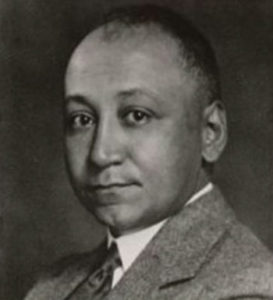
Louis T. Wright, 1934
This date marks the day Louis Tompkins Wright was born in 1891. He was a Black surgeon and hospital administrator.
Born in La Grange, Georgia, a doctor's son, Wright graduated from Clark University in Atlanta in 1911 and attended Harvard University medical school. While at Harvard, Wright strongly objected to being treated differently when a professor tried to prevent him from delivering babies at a white teaching hospital. This became an early example of his lifelong perseverance for equal rights. Unable to win an internship at any of Boston's hospitals despite graduating fourth in his class at Harvard, Wright did his postgraduate internship at Freedmen's Hospital, an affiliate of Howard University in Washington, D.C.
In 1916, he returned to Atlanta, went into practice with his stepfather, and joined the NAACP. When World War I began, Wright served as a lieutenant in the Army Medical Corps, ran a field hospital in France, and was awarded the Purple Heart. After the war, he started a small, general practice in Harlem in 1919 that became affiliated with Harlem Hospital.
All the while, he continued his NAACP work toward racial equality. As he became more prominent, Wright occasionally encountered opposition to his advocacy of more stringent educational standards; especially upset were those members of the Black medical establishment who had grown used to separate and, at times, unequal, less rigorous schools. The New York Police Department appointed him Police Surgeon in 1929. In 1935, the NAACP made Wright the chairman of its board. Eight years later, Harlem Hospital made him it's Chief of Surgery.
None of these positions had been held before by a Black person. Wright published 89 scientific papers, including several influential works on treating bone fractures. He helped develop new antibiotics and did pioneering cancer research. In 1940, he was awarded the NAACP's Spingarn Medal. Wright never completely recovered from the lung damage he had suffered in the war, and from 1939 to 1942, he was hospitalized for tuberculosis.
In 1952, he died following a heart attack. Despite its shortness and disruptions, his medical career was impressive. Harlem Hospital renamed its library after Louis Tompkins Wright shortly before his death. In a career combining medical and political achievements, Louis T. Wright was one of the most respected Black professionals of his time.
African Americans/Voices of Triumph
by Dr. Henry Louis Gates Jr.
Copyright 1993, TimeLife Inc.